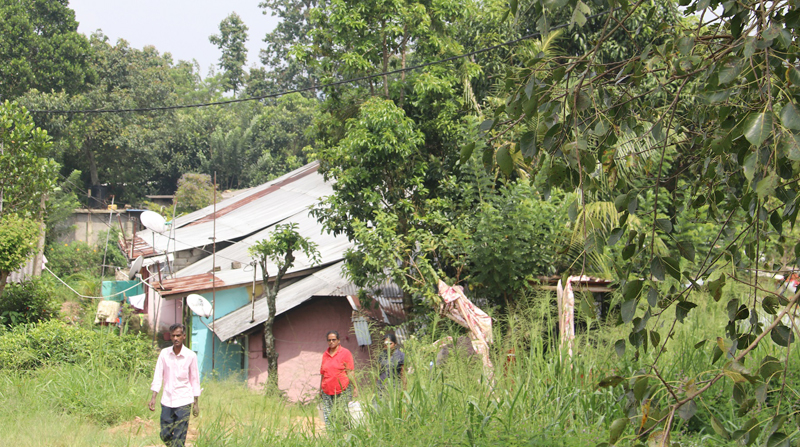“I was entrusted with this grocery business by my father in 1991. I was 24 years old at the time,” said S.R.A. Bandula, weighing the few 100 grams of groceries that Valliamma had asked for. At the same time, 23-year-old Mohamed Rifad was leaning against the counter and munching on a few parippu wades while listening to our conversation.
I was in the Little Valley colony situated in the Suduwella Grama Niladhari division of the Deltota Divisional Secretariat in the Central Province. The little grocery store run by Bandula and his wife Anoma Kumari is the first building on the narrow street that runs through the colony. “My father started the business when people could only afford to buy one beedi or half a cake of washing soap at a time,” recalled Bandula.
The street that runs through the colony was lined with small cottages which are in fact renovated line rooms and home to people from all three ethnic communities in Suduwella.
“My establishment is patronised by people from all three ethnic communities. Valliamma has been a regular customer for as long as I can remember and I have been in business even before Rifad was born,” he said.
Joining the conversation, Rifad said that Ven. Maha Asweddume Ananda Thera, the resident incumbent of the Sri Mighadaya Buddhist Centre in Suduwella, even refrains from broadcasting religious sermons and stanzas at times prayers are broadcast at the Jamiul Anwar Grand Mosque which is across the valley in Deltota.
Ven. Ananda Thera in turn said that the residents of Suduwella had great respect for each other’s ethnicity and religion and lived harmoniously. The Thera also said it was Ven. Rajakeeya Panditha Ambaliyedda Gunarathana Thera, Chief Sangha Nayaka of the Udahewaheta and Walapana districts as well as the Chief Prelate of the temple in Suduwella, who emphatically said that the resident priests and the communities living in Suduwella should never antagonise each other.
According to statistics obtained from the Deltota Divisional Secretariat, there are 3,626 people who belong to 326 family units living in the Suduwella Grama Niladhari division. There are more men than women and the majority of the residents were Tamil, followed by Sinhalese and Muslims.
Statistics published by the Census and Statistics Department based on the census conducted six years ago (2012) show that of a total national population of 20.3 million, 15,250,081 were Sinhala, while 3,108,770 were of Sri Lankan and Indian Tamil origin. The Sri Lanka Moor population was 1,892,638.
The same source showed that at the time, 14,272,056 were Buddhists, while 2,561,299 were Hindus and 1,967,523 were Muslims. Although there were no Christians in Suduwella, there were 1,552,161 Roman Catholics and Christians in the island.
Karuppaih Janaki (62) lives in the house adjoining Bandula’s shop and house. She recalled that she was only paid a wage of one rupee per day when she first went to work as a labourer at Little Valley Estate. According to Janaki, the labourers were from all communities and worked side by side like one family. “We went to work and returned back to our abodes together inasmuch as we shared stories and our tea and meal breaks,” she recalled.
Dingiri Menike (61) living on the other side of the village had just finished picking a handful of winged beans for lunch when I met her. Like Janaki, Dingiri Menike had also worked as a labourer for a wage of one rupee at Little Valley Estate. “I was about 16 or 17 years old when I first went to work. I used to collect my money and buy trinkets,” she recalled.
She also said that she had to work under Tamil overseers and was never treated differently. Dingiri Menike’s parents and grandparents were residents of Suduwella. “There has never been any disharmony between the villagers as far as I can remember, nor did my parents or grandparents ever mention of such incidents. We lived like one mother’s children and never had any differences,” she said.
Dingiri Menike’s son Sanjeewa Rathnayaka and daughter-in-law Shyamali Samudika who were sawing a piece of timber stopped their work to join the conversation. Sanjeewa worked as a carpenter, while Shamudika stayed at home to look after her two children, aged six and six months. “At times, I feel it is easier to get on with the other communities rather than with our own,” quipped Samudika, who hailed from Katugastota.
As I was leaving, she said with confidence in her voice, “There has never been any disharmony between communities in Suduwella in the past nor at present, and I believe that there won’t be any in the future.”




Add new comment